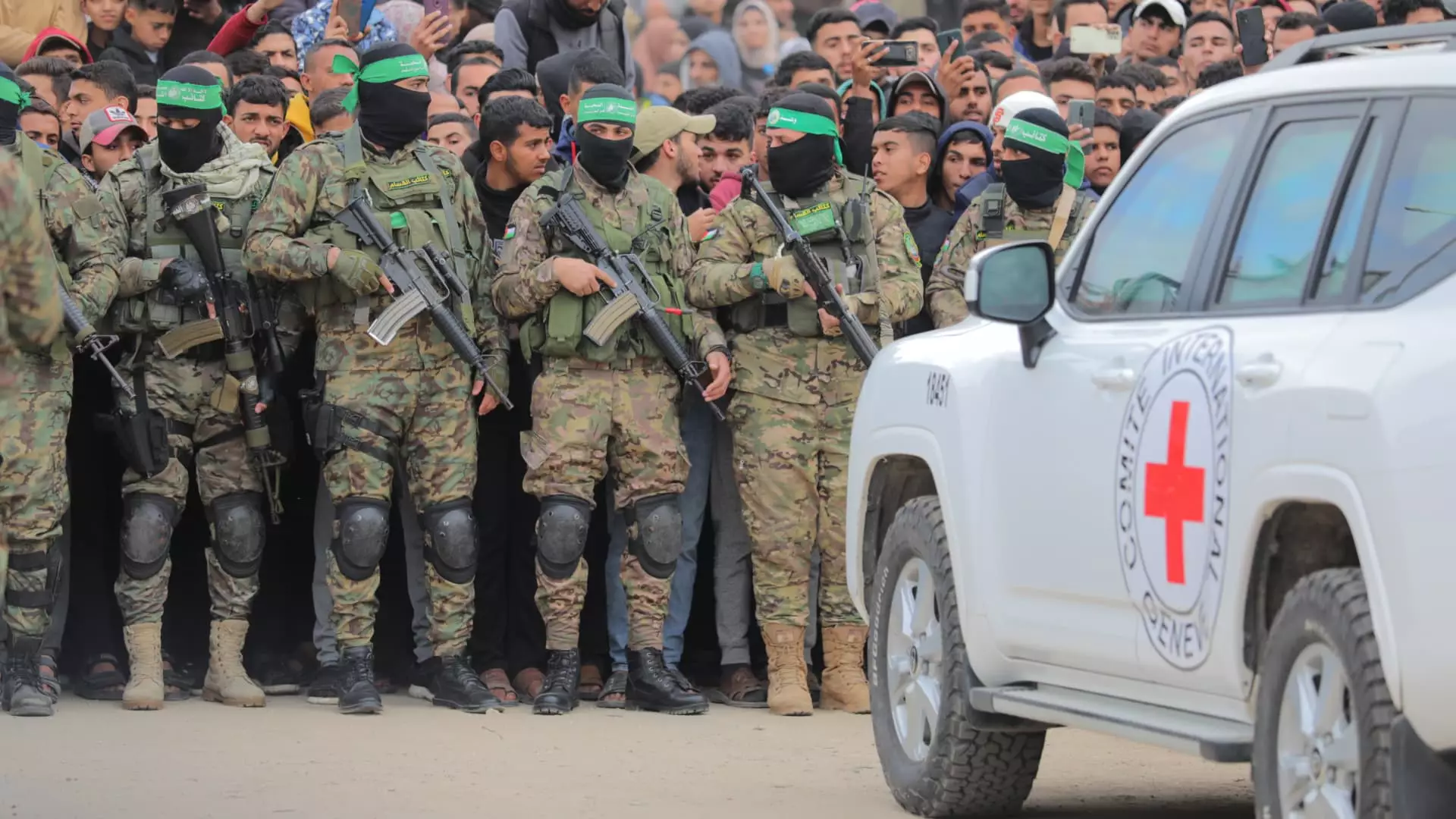On a somber Saturday, the Palestinian militant group Hamas released three Israeli hostages, an event that reverberated across both the Israeli and Palestinian territories. Ohad Ben Ami, Eli Sharabi, and Or Levy, all of whom were captured during the devastating Hamas-led attacks on October 7, 2023, emerged from their ordeal visibly weakened and traumatized. Their dramatic appearance, broadcast live, did little to mask the underlying pain and emotional tumult that families have endured for over a year. The moment encapsulated both a glimmer of hope for many families and a stark reminder of the brutal realities of conflict.
Photographed being led onto a podium surrounded by armed Hamas militants, the three men bore the unmistakable signs of their ordeal—thin, pale, and visibly shaken. The haunting image of Ben Ami’s frail figure resonated particularly with his family, as his mother-in-law recounted witnessing his condition on national television. This release was not merely a routine handover; it represented a complicated tapestry of human suffering stitched together by the threads of political strife.
In an intricate exchange brokered amid a tense ceasefire, Israel is set to release 183 Palestinian prisoners in return for the three hostages. This negotiation highlights the ongoing complexities that define this long-standing conflict, with exchanges often accompanied by enormous casualties and deep-seated grievances on both sides. The list of Palestinian prisoners includes individuals convicted for violent acts against Israeli citizens, complicating public sentiment in Israel about these exchanges.
The emotional toll of the hostage crises is further magnified for those families directly impacted. Sharabi, one of the released hostages, faces an excruciating reality: his wife and two teenage daughters were killed during the October 7 attacks on Kibbutz Be’eri. Such narratives of personal loss amidst broader political maneuvers underscore the fragile human element in negotiations deemed “diplomatic.”
Nearly three weeks into a 42-day ceasefire, brokered primarily with the support of U.S. involvement alongside diplomatic efforts from Egypt and Qatar, the deal appears to be teetering on a precipice. As diplomatic discussions on a second phase began, involving the release of more hostages and potential troop withdrawals from Gaza, urgency shadowed the proceedings. Concerns about the deal’s stability have intensified, especially following U.S. President Donald Trump’s provocative suggestion of relocating Palestinian populations from Gaza, a proposal met with vehement rejection from both Arab states and various Palestinian factions.
This proposition raised not only fears about ethnic cleansing but also illuminated the broader geopolitical dynamics at play. While Israeli Prime Minister Benjamin Netanyahu expressed support for potential exits from Gaza for Palestinians who wish to leave, critics have questioned the motivations and implications behind such a stance. In the wake of heart-wrenching losses on both sides, the potential for a comprehensive peace remains elusive, with each side grappling with disparate narratives of suffering and resilience.
Since the onset of hostilities, conflict has claimed staggering numbers—over 1,200 Israelis killed on October 7 alone and upwards of 47,000 Palestinian casualties as per Gaza health authorities. These statistics speak volumes about the prolonged anguish embroiling families and communities on both sides, transforming life into a daily battle punctuated by fear and loss.
As the details of these hostage exchanges, along with the intricate web of negotiations, unfold, it becomes increasingly evident that the human cost of this war transcends political narratives. Each life lost or regained is emblematic of a broader tragedy woven into the fabric of both societies. The urgency to find sustainable resolutions has never been clearer, yet paths toward understanding and reconciliation remain fraught with complexity.
As the world watches and hopes for a detente, the plight of individuals like Ohad Ben Ami, Eli Sharabi, and Or Levy serves as a poignant reminder of the human dimension of this conflict—one that appeals for empathy, understanding, and ultimately, lasting peace.

Leave a Reply